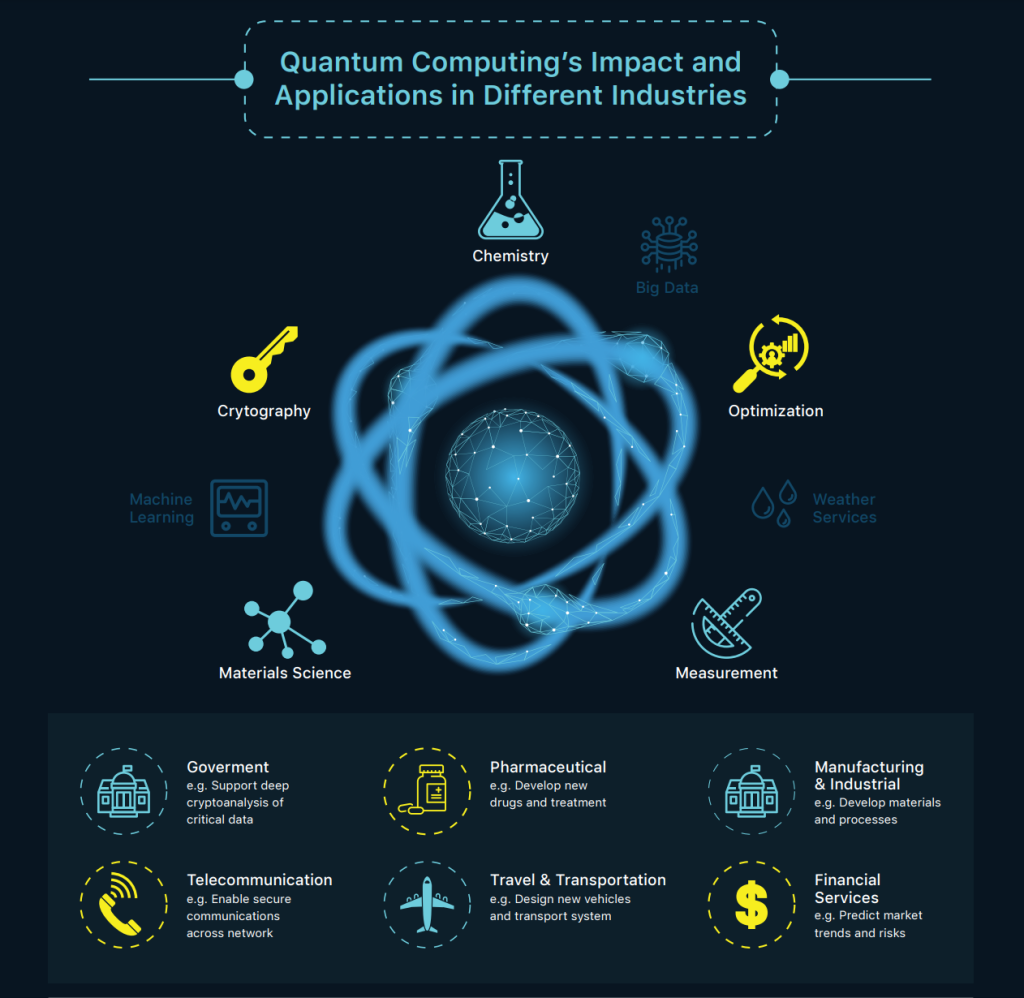The potential of quantum computing stands at the confluence of revolutionary technology and theoretical physics, poised to reshape numerous facets of our technological landscape. Although still in its nascent stages, quantum computing promises to catalyze profound advancements across various sectors. This discourse delves into the implications of quantum computing on various technological realms, including data processing, cryptography, artificial intelligence, and materials science.
To begin with, the fundamental architecture of quantum computing diverges significantly from classical computing. Classical computers utilize bits as the basic unit of information, which can exist as either a 0 or a 1. In stark contrast, quantum computers leverage quantum bits, or qubits, which can exist simultaneously in multiple states due to superposition. This allows quantum computers to handle vast amounts of data concurrently, leading to unparalleled speeds in processing and problem-solving capabilities. The ramifications of this foundational difference are profound.
One of the most immediate impacts of quantum computing is expected to materialize in the realm of data processing and analysis. Traditional algorithms often falter under the weight of complex datasets, but quantum algorithms such as Grover’s and Shor’s algorithms display exponential speedup for specific problems, such as searching unstructured data and factoring large integers respectively. Industries reliant on big data, such as finance and healthcare, stand on the precipice of transformation. Enhanced data processing capabilities could facilitate real-time analytics and decision-making, leading to more effective strategies and solutions.
The implications of quantum computing on cryptography are equally significant. Current encryption methods, predominantly based on the difficulty of mathematical problems, may find themselves obsolete in the quantum era. The advent of quantum algorithms capable of breaking widely used encryption protocols, such as RSA, necessitates a paradigm shift in cybersecurity practices. Consequently, the quest for quantum-resistant cryptographic schemes is imminent. This scientific endeavor will not only bolster data security but will also redefine trust in digital transactions, identity verification, and sensitive communications through enhanced encryption technologies.
Artificial intelligence (AI) represents another exciting arena for the application of quantum computing. Quantum-enhanced machine learning algorithms could usher in heightened performance in pattern recognition and predictive modeling. The complexity and dimensionality of datasets often hinder the efficiency of classical machine learning algorithms; however, quantum computers could alleviate these challenges by processing multiple scenarios and outcomes simultaneously. Potential applications range from optimizing supply chains to personalizing healthcare treatments—each tailored finely to individual needs, driven by insights that classical systems would struggle to achieve.
Furthermore, quantum computing holds promise in optimizing solutions for multifaceted problems in logistics, finance, and resource management. For instance, intricate optimization problems, like the traveling salesman problem, become tractable, allowing for real-time optimization of routes and resource allocation. This enhancement in operational efficiencies could lead to substantial economic advantages across industries, culminating in cost savings and improved service delivery.
The materials science sector stands poised to experience transformation akin to a renaissance, driven by quantum computing’s ability to simulate molecular interactions with high fidelity. Traditional methods of computational chemistry often necessitate simplifications that can overlook critical interactions in material properties. Quantum computers could accurately model complex chemical reactions, paving the way for the development of new materials with tailored properties, from superconductors to pharmaceuticals. Therefore, the convergence of quantum computing and materials science could catalyze innovations in energy storage, catalysis, and even nanotechnology.
Moreover, pharmaceutical research could benefit immensely from quantum simulations. Quantum computing could handle complex biological systems that are presently beyond the capacities of classical simulations. This capability would expedite drug discovery processes, fostering the development of novel therapeutics for various diseases, while concurrently diminishing the costs associated with pharmaceuticals. Notably, the timeframes for bringing new drugs to market could be substantially diminished, ultimately benefiting public health.
While it is critical to acknowledge the immense potential of quantum computing, it is equally important to recognize the challenges that lie ahead. Several technical hurdles remain, including quantum decoherence and error correction, which must be surmounted to unlock the full capabilities of quantum systems. Moreover, the ethical implications of deploying such powerful technologies cannot be overstated. The prospect of enhanced surveillance, data privacy breaches, and technological monopolies necessitates a robust framework of governance and public discourse that safeguards societal interests.
In conclusion, quantum computing stands at the threshold of unprecedented advancements across various technological domains. By redefining data processing, revolutionizing cryptography, enhancing artificial intelligence, and transforming materials science, quantum computing could reshape the contours of society and industry. As we traverse this uncharted territory, fostering interdisciplinary collaboration among physicists, computer scientists, ethicists, and policymakers will be paramount in harnessing the full spectrum of benefits while addressing the attendant challenges. In doing so, society can navigate the quantum frontier responsibly and judiciously, ensuring that the fruits of this revolutionary technology are equitably shared.












